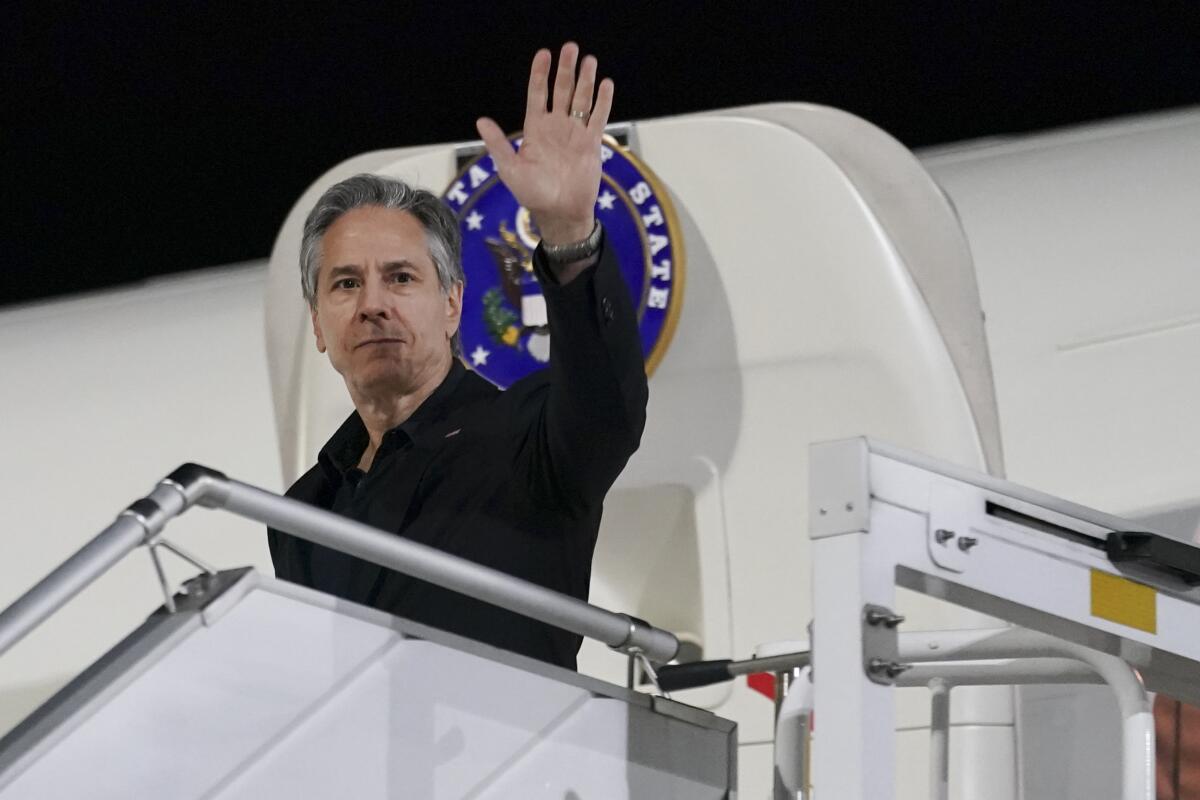The U.S. hasn’t figured out equality, but we sure are experts in the struggle

- Share via
WASHINGTON, D.C. — Hours before President Biden signed an executive order on Wednesday geared toward protecting queer and transgender people here in the U.S., Secretary Antony Blinken met with a handful of openly LGBTQ journalists at the State Department to talk about some of the challenges remaining abroad.
It was the first time that a sitting secretary of State has hosted a roundtable of this nature, officials told us. Blinken wasted little time before summing up the human rights challenges ahead.
“In some ways, whether or not the rights of this community are being protected, defended and advanced, or whether they’re being increasingly trampled upon,” he said, “we know as go the rights of critical groups, ultimately, so goes everyone.
“This is a deadly serious time around the world.”
There are roughly 70 countries that have criminalized LGBTQ identity or activity. Blinken said there are other countries considering doing the same, as well as making advocacy for equality a crime. Unfortunately, a significant amount of resources behind this current anti-LGBTQ movement comes from the U.S. For example, the Illinois-based World Congress of Families has been heavily involved in anti-queer initiatives in Hungary and Ghana, among other nations.
The secretary’s comments were far from parted clouds and rainbows, but it wasn’t all doom and gloom either. They were a reminder that although the recent wave of anti-LGBTQ laws in the U.S. and abroad are setbacks — hence Biden’s executive order banning “conversion therapy” — this country is still among the world’s best examples of what LGBTQ equality can look like when we continue to fight.
It’s easy to forget that progress when politicians try to stop drag queens from reading books at the public library. Or when legislators target transgender children and their families. When a candidate for Congress — a pastor who allied himself with President Trump — suggests our government should kill queer people and the TV anchor applauds, it’s easy to be consumed by the darkness.
But we are not the shining city on the hill because we are perfect. We shine because we refuse to accept imperfection. So when “Don’t Say Gay” bills are introduced, there are those who are willing to say “gay” even louder.
Of course, it would be nice if simply existing weren’t construed as a political statement, but then again it would also be nice if prejudice weren’t dressed up to look like public policy.
So while it is exhausting to constantly have one’s humanity used as a negotiating chip and debated in court, it is our willingness to fight that inspires the best in other nations. It was that very fight that gave birth to Pride Month. Stonewall was a riot, not a parade.
We can’t afford to forget that. Not when a member of Congress places a target on our backs by suggesting cisgender heterosexuals are an endangered species. Rep. Marjorie Taylor Greene’s unique spin on the nonsensical replacement theory may appear harmless or even laughable, but remember a white 18-year-old drove hundreds of miles to kill Black people in Buffalo because he cared about “the future of the White race.”
This kind of cultural baggage shouldn’t discredit American leadership on LGBTQ issues. It makes us experts on combatting hate.
“When I raise human rights issues, when I raise democracy issues, I often say to the people that we’re dealing with: It’s not exactly a secret that we have our own challenges that we’re working through at home,” Blinken said. “We’re not trying to sweep the problem or the issue under the rug. We’re acknowledging it. … And that continues to set us apart from most other countries that have problems that do try to pretend they don’t exist.”
The U.S. is in a position to lead by example — to confront issues like anti-trans initiatives. In speaking with officials from other nations, Blinken said, “we can ask you to do the same thing.”
And because of that, advocates abroad are paying attention and bringing change to their own countries.
Bhutan recently decriminalized homosexuality. A town in Bangladesh elected the nation’s first transgender mayor. When President Biden was vice president, same-sex relationships in Botswana were punishable by up to seven years in prison. Today they are not.
Jessica Stern, the U.S. special envoy to advance the human rights of LGBTQI+ persons, spoke passionately about the activists she’s engaged with in countries such as Thailand and Vietnam. She noted that this year’s Baltic Pride attracted 17,000, a high number for that region of the world. While in Malaysia, where laws criminalizing queerness remain on the books, she met the first transgender lawyer to be openly recognized by the bar association.
“We’re in a moment of polarization, and we have an incredible force targeting LGBTQI+ people around the world. And that’s not a new story, but it’s an energized story,” Stern said. “We also have LGBTQI+ organizations and activists cropping up everywhere.”
And the U.S. has a lot to do with that — whether through the Department of State’s Global Equality Fund, which provides emergency funding to LGBTQ activists globally, our embassies flying Pride flags again, or all of us celebrating here at home.
Lord knows when it comes to human rights, we don’t always get it right. But it matters to a lot of people around the world that we keep trying … for it’s in the trying that we can give others hope.
More to Read
A cure for the common opinion
Get thought-provoking perspectives with our weekly newsletter.
You may occasionally receive promotional content from the Los Angeles Times.










